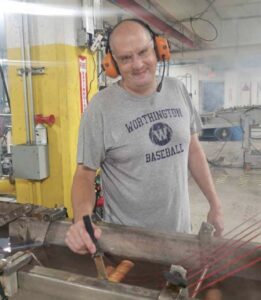A Dyersville manufacturer is saving time and money by implementing a strategy that identifies potential breakdowns before they occur.
JEDA Polymers, maker of engineered resins for the injection molding industry, was using a “homegrown solution” to anticipate issues in their extrusion lines. Though their efforts were moderately successful, the company couldn’t resolve all their issues on their own.
“This is a forward-thinking company that knows the value of data in resolving production issues,” said Kirk Haaland, CIRAS project manager. “They’d been searching for answers on their own, and they’d had some success with their efforts. So when we suggested predictive maintenance, they were all in.”
CIRAS recommended a strategy that involved placing sensors on the motors that power the company’s four extrusion lines. The sensors monitor data that the motors produce to identify potential problems or failures, enabling the company to address issues before they happen. CIRAS also connected JEDA
with two potential vendors, one of which was an especially good fit for the systems already in place at the company.
“With the contacts CIRAS provided, we’ve been able to move in the direction of Industry 4.0, which is an important goal,” said John Deeken, engineering and quality management system administrator at JEDA.
JEDA Polymers was started by Jeff Goodwin and Ronda Haskell in 2007 in central Illinois. The company moved into a 43,000-square-foot facility in Dyersville in 2015. They currently have 16 employees with plans to grow to 20. They offer more than 300 products to an everexpanding client list.

Problems with the motors that power JEDA’s extrusion lines can shut down production in that area for a week or more, idling workers and delaying shipments.
“So there’s lost production time, higher fees to expedite parts delivery, and unhappy customers who can’t understand why you’re running behind. These are the types of problems that predictive maintenance is helping them avoid,” said Haaland.
JEDA has a growing relationship with CIRAS. They first worked together when JEDA sought assistance with the application process for an Industry 4.0 grant from the state of Iowa.
“We didn’t get the grant, but we’ve continued working with CIRAS for the valuable services they provide,” said Deeken. “They were recently here facilitating an event focused on communications with the operations and shipping and receiving departments. We’re also utilizing their expertise as we implement lean principles.”
For more information, contact Kirk Haaland at khaaland@iastate.edu or515-520-7623.